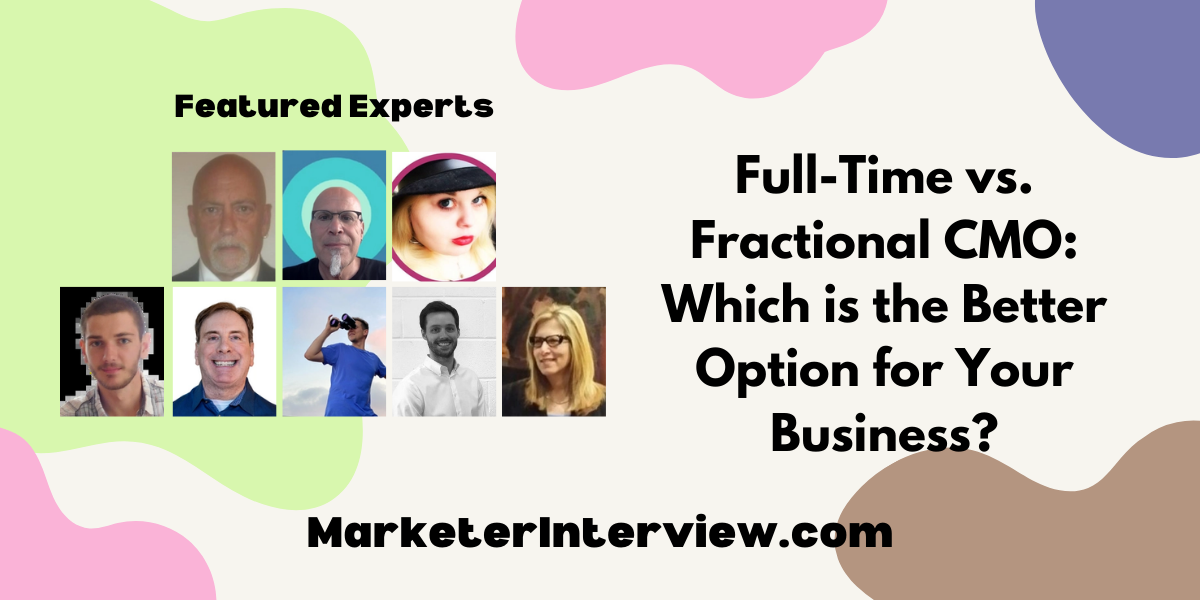Full-Time vs. Fractional CMO: Which is the Better Option for Your Business?
To shed light on the ongoing debate between hiring a full-time vs. fractional CMO, we’ve gathered insights from nine industry professionals, including Chief Marketing Officers and CEOs. From the perspective of fractional CMOs for startups, while full-time would be for established firms, to the viewpoint of fractional CMOs as advantageous for scaling, this article presents a range of expert opinions on the matter. Dive in to explore these diverse perspectives and make an informed decision for your organization.
Want to get quoted in MarketerInterview.com content just like this? Apply to become a contributor today!
Contents
- 1 Full-Time vs. Fractional CMO Choose Based on Your Company’s Specific Needs
- 2 Fractional CMOs for Startups, Full-Time for Established Firms
- 3 Full-Time CMO as a Driving Force for Growth
- 4 Start Fractional, Transition to Full-Time CMO
- 5 Fractional CMOs Bring Fresh Ideas and Current Knowledge
- 6 Both Options Depend on Business Life Stage
- 7 Decision Pivots on Startup’s Resources
- 8 Consider Immediate and Future Needs
- 9 Fractional CMO Advantageous for Scaling
Full-Time vs. Fractional CMO Choose Based on Your Company’s Specific Needs
The decision to hire a full-time vs. fractional CMO depends on the specific needs of your business. Both options have their advantages and disadvantages. In my opinion, a fractional CMO is more suitable for early-stage startups because you pay them on a project or part-time basis, and thus, you can use the remaining funds more efficiently. On the other hand, fractional CMOs work on a part-time or project basis, so they may not be available 24/7. Full-time CMOs can be fully dedicated to your organization and are typically more accessible.
There is no one-size-fits-all answer to whether it’s better to hire a full-time or fractional CMO. It depends on your specific requirements. You should assess your budget, long-term goals, immediate needs, and company culture to make a data-driven decision.

Tomáš Novák, Chief Marketing Officer, Marketing Miner
Fractional CMOs for Startups, Full-Time for Established Firms
Between full-time vs. fractional CMO, the adoption of fractional Chief Marketing Officers (CMOs), often as consultants, has grown significantly in recent years. It’s crucial for any organization to define its goals and what success looks like before bringing in a CMO.
Fractional CMOs are particularly well-suited for start-ups and scale-ups seeking to meet investor targets. They provide valuable knowledge and strategic guidance at a fraction of the cost. In contrast, CMOs in established organizations excel in offering high-level guidance, managing stakeholders, and overseeing the broader marketing function and how that relates to other business areas.
This strategic partnership allows tactical marketing leads to focus on achieving outstanding results without getting bogged down in executive-level dynamics.

Katrina Hutchings-Nichols, Chief Marketing Officer, Sannam S4 Group
Full-Time CMO as a Driving Force for Growth
Choosing between full-time vs. fractional CMO, I am a big believer in a full-time CMO (if you can afford the position). This position is the driving force for company growth and strategic development. The “CMO” becomes the “face” of the company, and they also work with all the other departments to ensure smooth delivery of services and product quality.
They will be the first person in the company to spot dissatisfaction with products/services from the customer base. The above is such a critical role on so many levels that to trust this position on a part-time level can prove disastrous or at the very least, unproductive.

Ron Greenfield, Chief Marketing Officer, Partners Edge
Start Fractional, Transition to Full-Time CMO
It really depends on your needs and budget. The biggest mistake is not having a true marketing professional to drive the strategy and planning to yield a continuous-growth mindset and execution.
Too many companies that do not have a budget simply have an inexperienced marketing manager post paid-media ads with discounts and call-to-actions (CTAs) to drive periodic sales stints, or do social postings without having a sound foundation in marketing that drives business results. Actions like this condition a target audience to shop for price without any brand loyalty and do nothing to create customer lifetime value.
My advice is, at a minimum, to bring on a Fractional CMO. Test them out, and if they successfully drive business KPIs, coach and mentor junior marketing employees, and work well with your leadership team, consider bringing them in full-time as your CMO when the budget allows.

Steve Goldner, Fractional Chief Marketing Officer, Beard Bros Pharms
Fractional CMOs Bring Fresh Ideas and Current Knowledge
A fractional CMO can be a great source of fresh ideas, even for more established firms. Because they work with more than one organization, they know what is working out there right now.
Depending on your industry, that can be critical knowledge, especially in today’s fast-changing online landscape. Full-time vs. fractional CMO diverse experience and perspective can help ensure the strategies developed yield tangible results.

Jeanne Klimowski, CEO, Wavelength Financial Content
Both Options Depend on Business Life Stage
As someone who has co-founded several startups, I’d say the decision between hiring a full-time vs. fractional CMO genuinely depends on the specific needs of your business.
For early-stage startups operating on a tight budget, a fractional CMO might be the better choice. They can provide the strategic guidance needed without the financial commitment of a full-time salary. But as your business grows, and the demands increase, a full-time CMO who is fully dedicated to understanding and driving your brand could become necessary.
For instance, in one of my startups, we initially hired a fractional CMO, who helped lay a robust marketing foundation. But as we scaled, we transitioned to a full-time CMO to help us navigate the increased complexity and demands. On the other hand, in another startup where we needed more specialized expertise for a specific marketing campaign, a fractional CMO was the ideal choice.

David Rubie-Todd, Co-Founder and Marketing Director, Glide
Decision Pivots on Startup’s Resources
From my experience, deciding between a full-time vs. fractional CMO pivots on the startup’s life stage and resource allocation. For early-stage ventures with tighter budgets and evolving strategies, a fractional CMO offers a wealth of diversified experience without the financial heft of a full-timer. They can steer the marketing helm, laying foundations and guiding teams with flexibility.
As the startup matures, however, the scales may tip. A full-time CMO’s constant presence becomes invaluable for in-depth, long-term planning and driving a marketing vision that’s fully baked into the fabric of the company’s culture. It’s a matter of timing and what resources you can spare—opting for agility initially, then perhaps settling into the steady rhythm of a dedicated CMO as the startup continues to grow.

Justin Albertynas, CEO, Ratepunk
Consider Immediate and Future Needs
While it might not surprise or satisfy to hear, there’s no one-size-fits-all answer. Determining full-time vs. fractional CMO or what’s best for your business isn’t rocket science, either. Just consider your immediate and future needs.
Unsure if you’ll need a CMO six months down the line? Then a full-time hire probably isn’t for you. Is your budget particularly tight? Then a fractional hire is a safer bet. But if your company can afford a 300k+ annual salary, a full-time CMO is viable, and you’re probably big enough to make great use of them.
It’s also important to remember that while it’s certainly more convenient to have a full-time CMO at your beck and call, there are great CMOs who contract freelance. And with today’s digital platforms, linking up with exceptional gig workers has never been easier.

Howard Davidson, CMO, Almond FinTech
Fractional CMO Advantageous for Scaling
In choosing between full-time vs. fractional CMO, Depending on your burn rate, runway, and whether you’re setting up to scale, it may be advantageous to hire a fractional CMO. Hiring a fractional CMO can result in cost savings and access to years of experience and insight without the financial commitment to a full-time employee. However, this relationship must be managed to ensure your company gains the expected value. A fractional CMO can guide a full-time, junior marketing executive.
In essence, the CMO takes care of the strategy, and the marketing executive takes care of the execution. This can be a win-win for a startup, or one on the cusp of scaling. I strongly recommend having a marketing employee in place before engaging a fractional CMO.
Robyn Hobson, Chief Marketing Officer, Remote Vans
Want to get quoted in MarketerInterview.com content just like this? Apply to become a contributor today!






